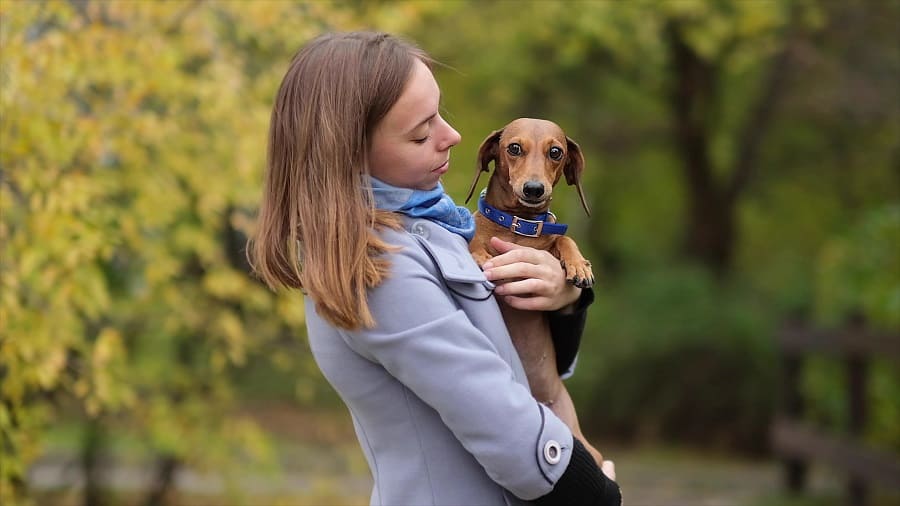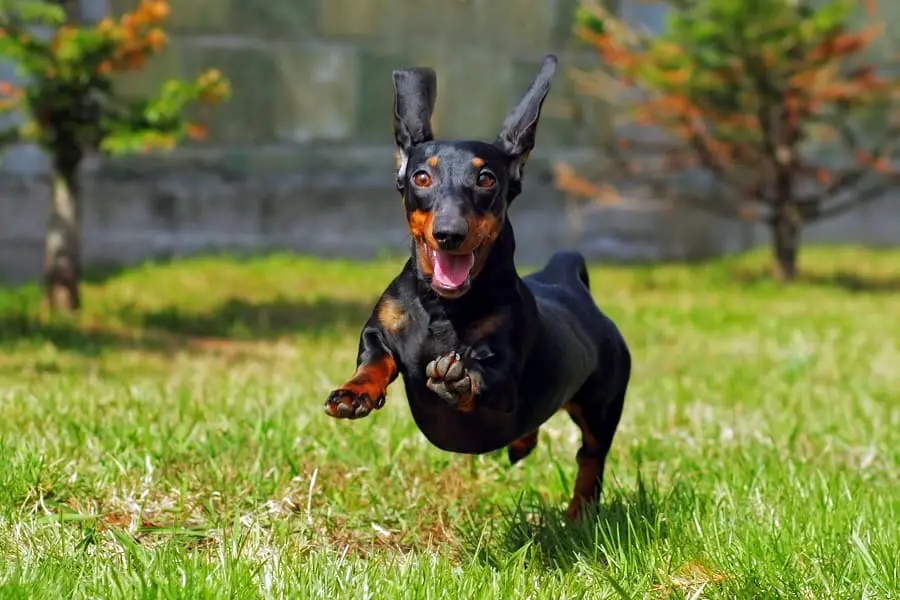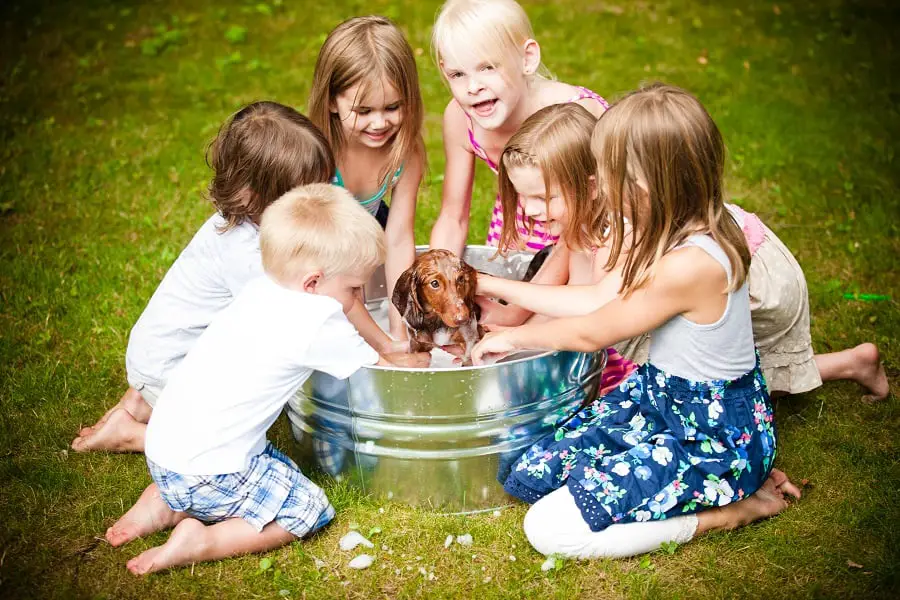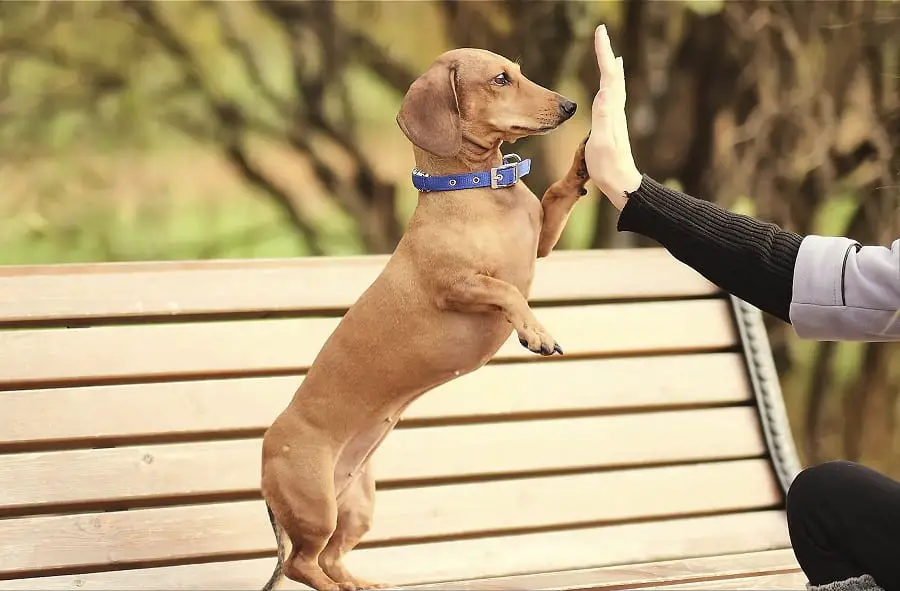Owning a Dachshund can bring several amazing benefits to your household.
Beyond the fact that they love unconditionally, Dachshunds, and pets in general, have been known to help lower blood pressure and manage stress.
They help keep you in shape by fulfilling their exercise needs and also teach your family about respecting and being kind towards animals.
While the benefits are obvious and almost limitless, there are many considerations to keep in mind before choosing to adopt a Dachshund.

One of the biggest factors most people consider before adopting this beautiful breed is the Dachshund’s friendliness.
A good temperament in a dog is enough for most people to overlook other, less attractive qualities.
So long as the dog plays well with people and other animals, potential adopters don’t seem to care as much about the negative aspects of their specific breed.
While Dachshunds come with challenges of their own, most would agree that they are among the most warm and docile of the many dog breeds in the world.
With this in mind, we’ve outlined some key characteristics of Dachshunds and why they are such friendly companions.
Popularity
Nobody wants an unfriendly dog, and the stats show it.
While friendly dogs such as the Dachshund are among some of the most popular across the globe, aggressive dogs such as Foxhounds, Beagles, and Chow Chows have decreased in popularity in recent years.
So many people are enamored with the welcoming nature of Dachshunds that according to AKC registration statistics, they rank 13th in popularity in the United States alone!
Considering there are over 300 distinct breeds of dog, this stat is nothing to shake a tail at.
Some notable figures that own or have owned Dachshunds are the likes of Grover Cleveland, the 22nd and 24th President of the US, Pablo Picasso, Andy Warhol, and many of the royal court throughout Europe, including Queen Victoria.
Beyond their lovability and charm, their easy-going personality and friendliness has led to their huge popularity among notable figures and regular folk alike.
Physical Characteristics
Some things are engraved in dogs’ personalities due to their physical appearance, and friendliness may be one of them according to research by the University of Veterinary Medicine Vienna.
The university designed a questionnaire that consisted of 237 questions about their dog’s behavior and sent it to dog owners across Vienna, Austria.
Of the thousands they sent out, 1276 people mailed back their surveys.
Using this data, the university concluded that smaller dogs seemed to be more excitable and aggressive than larger breeds.

The study pointed to conclusions that the smaller a dog is, the worse their fear and anxiety may be.
While Dachshunds are a smaller breed, they are nowhere near the far end of the spectrum.
Coming in at 16-33 pounds fully grown (this includes their miniature breed), Dachshunds can tower over some of the smaller breeds such as Chihuahuas, Boston Terriers, and Miniature Pinschers, and some breeds are considered to be medium-sized dogs.
So, while they are a smaller breed than the average sized dog, Dachshunds may not scare as easily or be as aggressive as even smaller breeds, according to the results of the study.
If friendliness of your adopted pet is a large factor for you, you may want to opt for a standard, rather than miniature breed of Dachshund.
Behavioral Traits
Dachshunds’ personality ranges from individual dog to individual dog, but many of the breed share similar qualities.
Dachshunds were trained to be hunters and as such, they are very alert little watchdogs, though their bark is worse than their bite.
Dachshunds tend to “sound the alarm” at the approach of strangers, dogs, or unfamiliar stimuli if they encroach on their personal space.
This is a key element of their personality as they were trained to alert hunters to the presence of den animals.
Though barking is embedded in their personality, they still play friendly once they are socialized to the strange stimuli.
Dachshunds are also very possessive and tend to guard their property adamantly.
If left untrained, they will be quite hesitant to share their belongings with anyone, including other dogs and young children.
Another quality which was bred into the breed, is their desire to dig.
As we stated before, they were originally bred to dig den animals out of the ground.
This instinct remains strong in these animals and if left unchecked, can cause havoc to your yard.
Though these qualities are less than desirable, studies have shown that with proper training, they can be mitigated or outright eliminated in your pet.
Additionally, when properly socialized, the breed actually becomes quite friendly to others and has been known to share and be affectionate towards strangers.
This requires a lot of patience and proper training, especially at a young age, but it can be done.
Personality
Though most Dachshunds are known to be small, these dogs are known for their courage and in the past, when they were used as hunting dogs, were known for taking on animals much larger than themselves.
When not properly trained, they will act aggressively towards other dogs and some strangers.
They will, however, make an excellent family dog. They are known to be loyal companions and are great watchdogs.

If the children treat them well, then Dachshunds will repay the treatment in kind.
Some breeders argue that different varieties of Dachshunds can have different personalities.
A popular perception is that wire-coat Dachshunds are more outgoing than the other varieties.
Others report that the long-coat variety is supposedly more docile than their smooth-coat counterparts.
Social Training
As the saying goes, There’s no such thing as a bad dog, just bad owners. This rings true when you consider the Dachshund.
If trained properly, most breeds seem to be charismatic, charming, and sociable.
Even so, Dachshunds seem to be among some of the more intelligent breeds (having their origins traced back to use as skilled hunting dogs), and can pick up on many social cues instinctually.
That being said, you shouldn’t rely on your Dachshunds instincts alone in order to help them become friendly adults.
Sociability training is a critical component in making any dog friendlier. This does not simply mean placing your puppy on strangers’ laps and hoping for the best.
Instead, use your Dachshunds intelligence and follow these simple steps to help your puppy or grown adult become more genial:
Environment Training
Introducing your Dachshund to new environments early on in your relationship will help it to develop better coping mechanisms to strange outside stimulants.
Take them to the park, go for a walk inside of your bustling downtown metro, introduce them to the beach, let them play in the mud, or show them any other environments which you might frequent in order to increase their situational awareness.
Touch Training
Dachshunds were bred to be hunters. If untrained, they can be a little rough around the edges at times when strangers touch them.
Instead, associate touch with some kind of reward. When you lay their food down for them to eat, encourage their friendliness by kneeling down to pet them.
They will begin to associate touch with food and may even begin to welcome touch when strangers do it. Have friends do the same if this is possible.
Share Training
Introduce new toys to your Dachshund and take them away. When they growl or yelp for the toy, do not give it back. Only give it back when they do not growl.
This will help socialize your dog into sharing its possessions instead of being overly possessive of them.
This is especially valuable if you are hoping to have your dog play well with other dogs.
Social Situation Training
Just like environment training, social training takes your Dachshund into the real world to help them break their boundaries.

Social training is different in that you are looking for places where your Dachshund will have to interact with strangers.
Choose busy locations such as stores that let dogs in, and if approached, let the strangers pet your dog. In this time, keep your body language relaxed.
If you tense up, your Dachshund is intelligent enough to pick up on this change and will respond accordingly.
Always try to stay relaxed when introducing your Dachshund to strangers as they will learn from your example.
Friendliness
Dachshunds are a historic breed with roots as far back as 300 years in Germany. They are rugged, steadfast creatures with an innate desire to please their masters.
When trained properly, they can be one of the most friendly breeds and are very socially alert.
They love to play at home and enjoy the company of other dogs in moderation.
They can pick up on social cues quickly which makes training a simple, albeit long, process.
If you’re considering adopting a dog and take their friendliness into huge consideration, a Dachshund could be the right choice for you.
